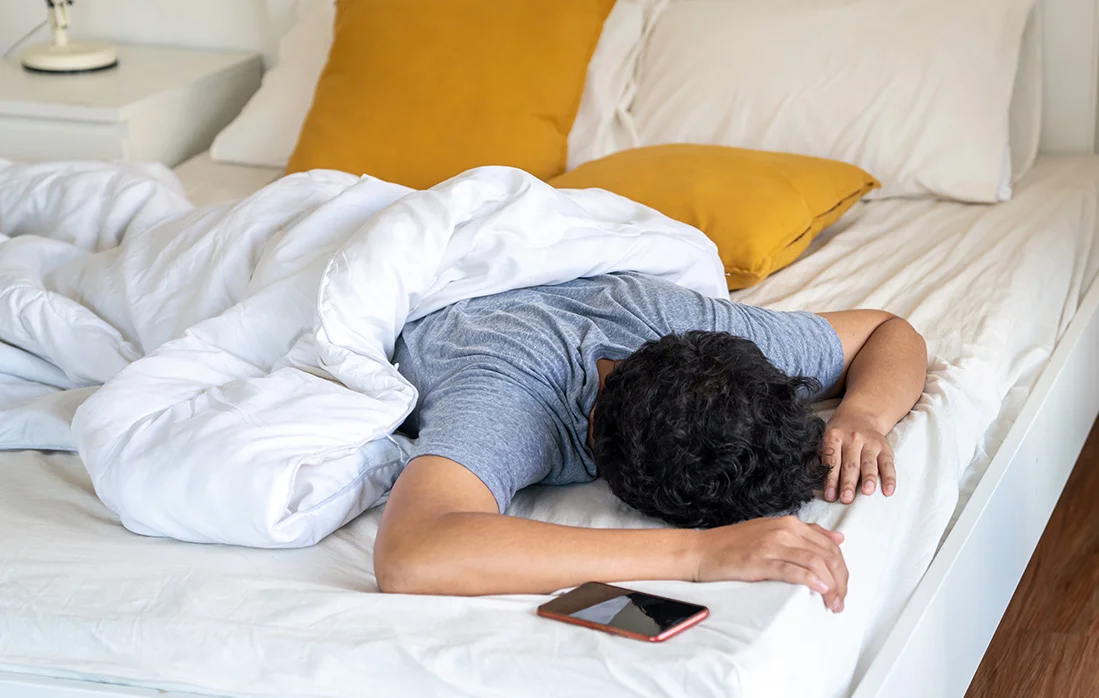I use a wearable gadget called the Pavlok Shock Clock to wake up. Yes, I really wake up via electric shock by choice.
The device attaches to your wrist like a watch and can administer a shock at a set time to get you out of bed. The Pavlok can also beep or vibrate. In fact, it vibrates first and then shocks you if you don’t wake up or if you hit snooze.

Pavlok isn’t designed as just an alarm clock. In theory, it could help you break habits like smoking as well. “Pavlok works by associating the habit you want to change or improve with a slightly uncomfortable electrical impulse,” Pavlok’s website reads. “The device helps train your brain to associate the behavior you want to change with the uncomfortable stimulus.”
I don’t use it for this purpose — I use it solely as an alarm clock.
It’s Something I Don’t Bring Up Often Because It Sounds Intense
When I bring it up, my friends give me a strange look. But it’s not as intense as it sounds.
When I first ordered it, I opened it and set an alarm to see what it would feel like. You can adjust how intense the shock is in the Pavlok app. It was uncomfortable but not as bad as I thought.
Plus, when I use it to wake up, I find that I’m too groggy to really register the pain. It wakes me up, and it is unpleasant, but I wouldn’t go as far as to say painful. Dr. Joshua Tal, a Clinical Psychologist, likened it to the game Operation: “It’s a low threshold of electricity. It doesn’t hurt per se, but it feels very weird.”
He explained that there are therapeutic devices that use electrical stimulation, but with the Pavlok, it’s more of a punishment than a therapeutic device. Other alarms have used punishment — ones that make annoying sounds, shake the bed, or even shred money. “There’s a history of this idea that if a negative thing were to happen if you don’t wake up on time, then it will motivate you to wake up on time,” he said.
However, he noted that people with trauma in their past should avoid the Pavlok. “Someone who has a history of trauma has had horrendous single or multiple horrendously punishing events in their life,” he said, “And what happens with a history of PTSD or complex trauma is that you start to generalize what’s actually dangerous, and there are a lot more things that are dangerous.” He explained that people with a history of trauma often wake up with an overwhelming amount of anxiety and cortisol. He believes using a device like the Pavlok could backfire and lead to more anxiety.
Dr. Tal has recommended the Pavlok to a patient before and said it’s best for people who have tried other alternatives and are open to an unconventional approach.
This Is Not the Ideal Way to Wake Up
Shocking yourself awake could cause more anxiety. Dr. Shelby Harris, Sleepopolis’ resident sleep expert, prefers “loud or moving alarm clocks, as well as puzzle alarm clocks on your phone or even things that vibrate the bed or pillow.”
Dr. Carleara Weiss has not recommended the Pavlok before, and told me, “My work focuses on behavioral sleep medicine and empowering people to identify and willingly change their behaviors to achieve better sleep and health. In that sense, the shock could be an unpleasant or a negative reinforcement associated with sleep and wake-up time and would not fit the goal of my research practice.”
But For Me, the Pavlok Works — For Now.
I don’t use my Pavlok every day, but I use it about three times a week on average. I will use it on days I know I will have trouble waking up for an early workout class, flight, or work assignment. I will also reach for it if I go to bed unusually late the night before.

I often worry I won’t wake up on time. I used to wake up every day at the same time without really thinking about it. But more recently, I’ve been sleeping through alarms. The Pavlok is the only thing I feel confident in to wake me up without fail. For that reason, it eases some of my concerns about sleeping through something important.
It’s also great for couples or roommates. It’s silent so that it won’t wake a sleeping partner.
“Many people benefit from Pavlok, including couples with different sleep schedules and people with difficulty waking up in the morning,” Dr. Weiss wrote. “It promises to train the user to wake up at a scheduled time, and some pre-clinical research done with mice corroborates that.”
She recommends checking with your primary care provider before using Pavlok to ensure it is safe if you have any medical conditions such as cardiovascular diseases or anxiety.
Before Considering, Know That the Pavlok Comes With a Hefty Price Tag
The Pavlok 3 — the newest model — costs $189.99. I got the Shock Clock 2 for $149.99, and the Shock Clock goes for $129.99
It was something I purchased after trying cheaper alternatives. But, for me, it has been worth it while I try to regulate my sleep patterns in other ways.
Hopefully I Won’t Use It Forever
Even though I have liked the Pavlok, I hope to regulate my sleep patterns in other ways that I can adjust. Dr. Harris says, “If your irregular sleep schedules are due to your own choices, staying up late to go out, or getting up early some days for other things, and it is all within your control, then I highly consider working to keep a more consistent sleep-wake schedule more days than not.”
If you work irregular hours, she recommends finding an “anchor sleep period” that stays consistent every night. For example: sleeping between 4 a.m. and 8 a.m., no matter if you have an early or late night. She also says to limit things that can impact sleep quality, such as alcohol or drugs.
Editor’s note: Sleepopolis strongly encourages anyone considering the Pavlok or similar devices to consult with a doctor first. For more tips on starting your day, check out Sleepopolis’s ultimate guide to waking up refreshed.

De-stressing Your Sleep Routine with Psychologist Dr. Joshua Tal

According to New Apple Watch Sleep Study, Americans REALLY Aren’t Getting Enough Sleep

Best Wake-Up Lights for Better Wakefulness

Can This Swiss Brand’s Science-Backed Sleepwear Really Cure Everything From Insomnia to Hot Flashes?
Sources
Tal, Dr. Joshua. Author interview. April 2024.
Harris, Dr. Shelby. Author interview. April 11, 2024.
Weiss, Dr. Carleara. Personal interview. April 2024


























